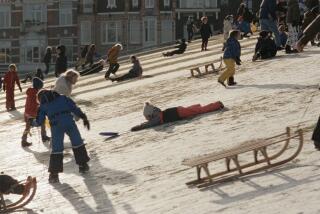‘Forbidden Films’ of East Germany at Goethe
- Share via
The Goethe Institute, 5700 Wilshire Blvd., will present “The Forbidden Films,” six mid-’60s East German films banned until the Berlin Wall crumbled in 1989. The series begins Tuesday at 7 p.m. with an introduction by UC Irvine professor Eric Rentschler, to be followed at 8 p.m. by Jurgen Bottcher’s “Born in ’45.”
What’s most amazing about these six pictures is not that they were banned but that their makers dared to attempt such critical films in the first place. None is a call for revolution but rather for reformation, and, as such, they are utterly revealing of life in a regime that not only was repressive but also in its workings woefully inefficient and unjust.
The films--all but one shot in black-and-white--add up to a comprehensive, warm and loving portrait of the daily lives of ordinary people living mainly in drab East Berlin, where sterile Socialist architecture contrasts with grand, largely unrestored historic structures damaged in World War II.
Written by Bottcher with Klaus Poche, “Born in ‘45” captures perfectly a rough patch in the marriage of a young East Berlin couple. The wife (Monika Hildebrand) is a maternity ward nurse and her lanky, unhandsome husband (Rolf Romer) an auto mechanic on vacation, a factor that exacerbates their situation.
In this shoot-from-the-hip, ultra-real film--occasionally, perhaps inevitably, Bottcher lapses into the tedium he depicts--there is no direct criticism, yet the couple’s frustration in general and the husband’s aimlessness in particular reflect the listlessness and lack of real opportunity for the average East German citizen.
Screening Thursday at 6 p.m. and again at 8:30 p.m., Herman Zschoche’s “Karla” is a classic tale of an innocent gaining experience the hard way. Karla (Jutta Hoffmann) is a pert young teacher fresh out of college and off to her first teaching job (in the rural north). Upon arrival the idealistic, profoundly naive Karla blithely announces her dedication to truth and “absolute” honesty. These precepts will be sorely tried when she predictably runs afoul of the educational bureaucracy, exemplified by an icy, lacquered blond inspector (Inge Keller), despite the attempts by her kindly, elderly principal (Hans Hardt-Hardtloff) to protect her from herself.
Karla finds romance with a savvy sawmill worker (Jurgen Hentsch), a one-time journalist who lost his career when he dared to write about Stalin’s crimes, but the heart of the matter is the question the film poses so courageously: How can you hope to have a decent educational system unless your teachers have the freedom to speak the truth as they, rather than the Communist Party, see it? Information: (213) 525-3388.
The UCLA Film Archive’s “Multicultural Europe” continues Thursday at 7:30 p.m. in Melnitz Theater with Marzak Allouache’s “Un Amour a Paris,” one of the best films in this provocative series dealing with the experiences of immigrants in European countries. Catherine Wilkening plays a radiantly beautiful Algerian who comes to Paris to pursue her dream of becoming a model only to fall in love with a handsome, muscular loser (Karim Allaoui), a native Parisian born to Algerian emigres who naively resorts to crime to finance his dream of going to America to become an astronaut. A heart-tugging breaking romance set down in the gritty realism of Paris’ impoverished Belleville district. (310) 206-FILM.
More to Read
Only good movies
Get the Indie Focus newsletter, Mark Olsen's weekly guide to the world of cinema.
You may occasionally receive promotional content from the Los Angeles Times.










